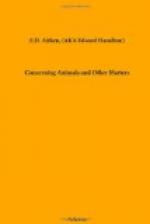NOSES
Some may think that I have chosen a trivial subject, and they will look for frivolous treatment of it. I can only hope that they will be disappointed. There is nothing that the progress of science has taught us more emphatically than this—that we must call nothing insignificant. Seemingly trivial pursuits have led to discoveries which have benefited all mankind, and priceless truths have been dug out of the most unpromising mines. I am not insinuating that anyone’s nose is an unpromising mine, but I say that I am persuaded there is wisdom hidden in that organ for him who will observingly distil it out.
[Illustration: A SHREW CAN DO IT, BUT NOT A MAN.]
It possesses a peculiar and mystical significance not shared by any other feature. This is abundantly proved by common speech, which is one of the most trustworthy of all kinds of evidence. For example, we speak of a person turning up his nose at a good offer. The phrase is absurd, for the power of turning up his nose is one which no human being ever possessed. A shrew can do it, but not a man. Yet the meaning of the saying needs no interpretation. Akin to it is the classical phrase, adunco suspendere naso. What Horace means scarcely requires explanation, but no commentator has successfully explained it. These expressions well illustrate the mystery that enshrouds our most salient feature. They show that, while everybody can see that disdain is expressed through the nose, nobody can define how it is done. Then there is that curious expression “put his nose out of joint,” which is quite inexplicable, the nose being destitute of joint. There are many other phrases and also gestures which point in the same direction, but need not be cited, being for the most part vulgar. Allusions to the nose have a tendency to be vulgar, which is another mystery inciting us to investigate it. So let us proceed.
The first thing required by the principles of scientific precedure is a definition. What is a nose? But this proves to be a much more difficult question than anyone would suspect before he tried to answer it. The individual human nose we can recognise, describe or sketch more easily than any other feature, but try to define the thing nose in Nature and it is a most elusive phenomenon. When we speak of a man being led by the nose we imply that it is a part of him which is prominent and situated in front, when we speak of keeping one’s nose above water we refer to it as the breathing orifice, but when we say that this or that offends our nose we are regarding it as the seat of the sense of smell. I believe that all these three ideas must be included in any definition. It should follow that insects, which breathe through holes in their sides, cannot have noses, and this is the truth.




